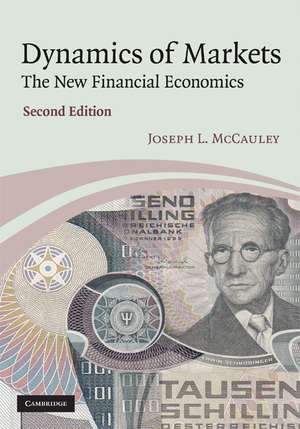Dynamics of Markets: The New Financial Economics
Autor Joseph L. McCauleyen Limba Engleză Hardback – 2 sep 2009
Preț: 459.06 lei
Preț vechi: 578.06 lei
-21% Nou
Puncte Express: 689
Preț estimativ în valută:
87.84€ • 91.95$ • 73.11£
87.84€ • 91.95$ • 73.11£
Carte indisponibilă temporar
Doresc să fiu notificat când acest titlu va fi disponibil:
Se trimite...
Preluare comenzi: 021 569.72.76
Specificații
ISBN-13: 9780521429627
ISBN-10: 0521429625
Pagini: 286
Ilustrații: 19 b/w illus.
Dimensiuni: 178 x 253 x 16 mm
Greutate: 0.73 kg
Ediția:2 Rev ed.
Editura: Cambridge University Press
Colecția Cambridge University Press
Locul publicării:Cambridge, United Kingdom
ISBN-10: 0521429625
Pagini: 286
Ilustrații: 19 b/w illus.
Dimensiuni: 178 x 253 x 16 mm
Greutate: 0.73 kg
Ediția:2 Rev ed.
Editura: Cambridge University Press
Colecția Cambridge University Press
Locul publicării:Cambridge, United Kingdom
Cuprins
Preface; 1. Econophysics: why and what; 2. Neo-classical economic theory; 3. Probability and stochastic processes; 4. Introduction to financial economics; 5. Introduction to portfolio selection theory; 6. Scaling, pair correlations, and conditional densities; 7. Statistical ensembles: deducing dynamics from time series; 8. Martingale option pricing; 9. FX market globalization: evolution of the dollar to worldwide reserve currency; 10. Macroeconomics and econometrics: regression models vs. empirically based modeling; 11. Complexity; Index.
Recenzii
From the first edition: '… well written. The reader is not burdened with lengthy accounts and lots of plots of outdated data … This is an important contribution to the understanding of how financial markets actually perform and both students and researchers interested in econophysics should study this book carefully.' Jan Sladkowski and Edward W. Piotrowski, Mathematical Reviews
'… a refreshing text about the main ideas of econophysics.' F. H. Berkshire, International Statistical Institute
'… excellent little book … fully takes on board the volatility of the markets.' Steven Bishop, University College London
'A thought-provoking book. It does not only argue convincingly that the 'King - of orthodox economic theory - is naked', but offers a challenging economic alternative interpretation regarding especially the dynamics of financial markets.' Giovanni Dosi, Sant'Anna School of Advanced Studies, Pisa
'The heart of McCauley's book is a closely-reasoned critique of financial-economic mathematical modeling practice. McCauley's demonstration of the incompatibility between the assumptions of market-clearing equilibrium and informational efficiency is stunning, and sheds much-needed light on the mathematical modeling failures revealed by the financial melt-down. His unvarnished criticisms of neoclassical economic doctrine deserve equal attention. McCauley opens the windows of the self-referential world of economics to the fresh air of a mathematical physics point of view grounded in economic history and common sense. Neither monetarist, neoclassical, nor Keynesian schools of economics will take much comfort from McCauley's work, but they all have a lot to learn from it.' Duncan K. Foley, Leo Model Professor, New School for Social Research and External Professor, Santa Fe Institute
'McCauley's mathematically and empirically rigorous Dynamics of Markets is one of those rare works which is challenging, not only to an intellectual orthodoxy (neoclassical economics), but also to its fledgling rival (econophysics). Neoclassical economics and finance theory receive justifiably dismissive treatments for failing empirically, but some econophysics contributions also distort empirical data - notably McCauley shows that 'fat tails' in data can be the result of applying an unjustified binning process to nonstationary data. McCauley's essential messages for the future of economics after the global financial crisis is that 'There is no statistical evidence for Adam Smith's Invisible Hand', and that the hand that does exist and must be understood is both non-stationary and far from equilibrium.' Steve Keen, University of Western Sydney
'… a refreshing text about the main ideas of econophysics.' F. H. Berkshire, International Statistical Institute
'… excellent little book … fully takes on board the volatility of the markets.' Steven Bishop, University College London
'A thought-provoking book. It does not only argue convincingly that the 'King - of orthodox economic theory - is naked', but offers a challenging economic alternative interpretation regarding especially the dynamics of financial markets.' Giovanni Dosi, Sant'Anna School of Advanced Studies, Pisa
'The heart of McCauley's book is a closely-reasoned critique of financial-economic mathematical modeling practice. McCauley's demonstration of the incompatibility between the assumptions of market-clearing equilibrium and informational efficiency is stunning, and sheds much-needed light on the mathematical modeling failures revealed by the financial melt-down. His unvarnished criticisms of neoclassical economic doctrine deserve equal attention. McCauley opens the windows of the self-referential world of economics to the fresh air of a mathematical physics point of view grounded in economic history and common sense. Neither monetarist, neoclassical, nor Keynesian schools of economics will take much comfort from McCauley's work, but they all have a lot to learn from it.' Duncan K. Foley, Leo Model Professor, New School for Social Research and External Professor, Santa Fe Institute
'McCauley's mathematically and empirically rigorous Dynamics of Markets is one of those rare works which is challenging, not only to an intellectual orthodoxy (neoclassical economics), but also to its fledgling rival (econophysics). Neoclassical economics and finance theory receive justifiably dismissive treatments for failing empirically, but some econophysics contributions also distort empirical data - notably McCauley shows that 'fat tails' in data can be the result of applying an unjustified binning process to nonstationary data. McCauley's essential messages for the future of economics after the global financial crisis is that 'There is no statistical evidence for Adam Smith's Invisible Hand', and that the hand that does exist and must be understood is both non-stationary and far from equilibrium.' Steve Keen, University of Western Sydney
Notă biografică
Descriere
Second edition, now explains the history leading up to the biggest economic disaster of the 21st century.
